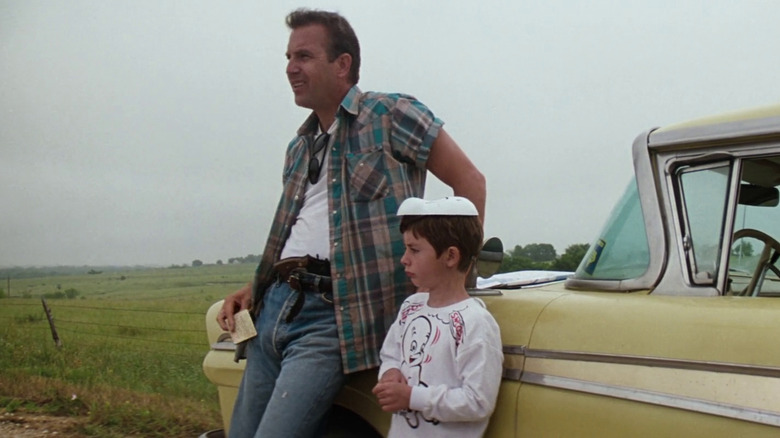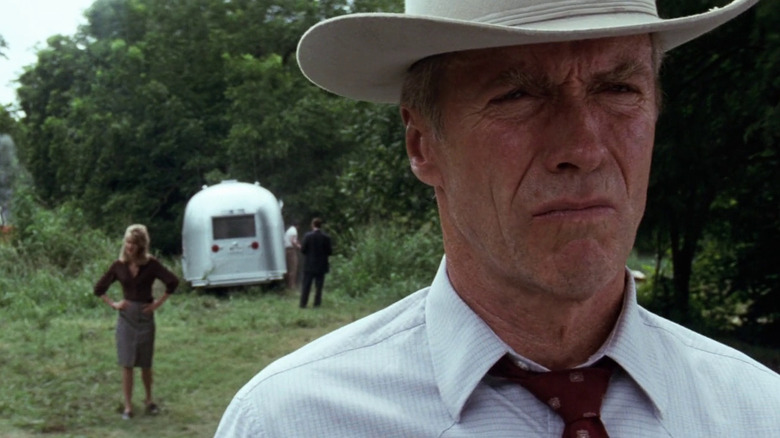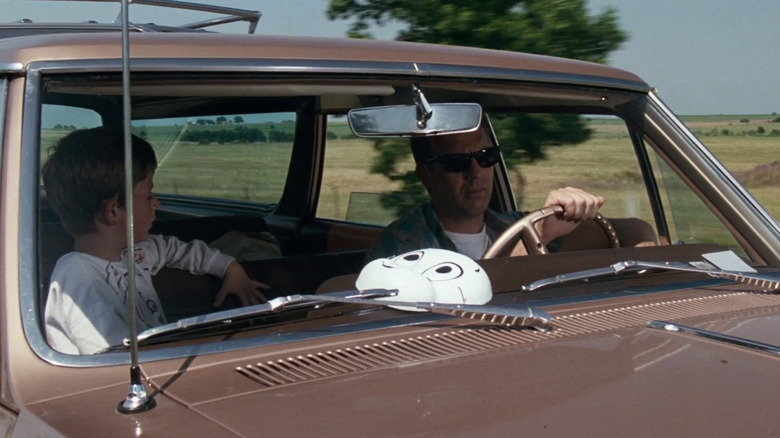Yellowstone's Kevin Costner Starred In This Underrated Clint Eastwood Crime Drama
To any cinephile over 30, it doesn't feel right to call Clint Eastwood's "A Perfect World" underrated — and yet, if you ask Google, it'll tell you that the 1993 crime drama is considered to be just that. But if you're as familiar with the Hollywood legend's filmography (as a director) as I am, you damn-well know that this Kevin Costner-led gem is a stone-cold classic, easily taking a spot in the actor-director's top 10. But let's not get bogged down by personal rankings/preferences, and put them aside for a bit — there are more important things to talk about when it comes to this movie.
If you grew up as a child of divorce (raised primarily by a single parent) with an absent father like I did, "A Perfect World" speaks to your heart in a way that very few films can. It offers a fantasy that we as shy, abandoned, insecure boys often entertained throughout our childhood without being conscious of it. Because the thing is, when you have an absent dad (which ironically means not having one), you begin to idolize him in your mind. You daydream playing catch with him, picking you up after school in the coolest car, taking you to memory-defining football games that you'd fondly recall as an adult. What's worse, if you do have a Pop who sporadically re-appears in your life (let's say, every other weekend), no matter how little he gives you, emotionally or otherwise, you treasure that thing as your most-prized possession. You overcompensate for a sin that isn't yours to bear.
Despite its loosely disguised plot as a "fugitive on the run taking an 8-year-old boy hostage," "A Perfect World," at its core, is truly about fathers and sons — the complicated relationship, or lack thereof, between them — and the pain inflicted on us at an early age that we carry like a never-healing wound throughout our lives.
Earning a boy's trust in A Perfect World
Set in 1963 in Texas, the plot follows Butch Haynes (Costner) as he escapes from a state prison with his moronic and nasty cellmate, Terry (Keith Szarabajka), and they go on the run. This "partnership" isn't by choice: Butch hates the guy's guts and plans to ditch him as soon as possible. Before he can do that, though, Terry breaks into a home and tries to molest a single mother of three, and Butch needs to intervene. The commotion wakes up young Phillip (T.J. Lowther), alongside the neighbors, who wanders into the kitchen to find two strange men there. A pistol is right before him on the floor, and Butch asks him to pick it up and bring it over. But instead of snatching it from the boy, he tells him to point it at him and say, "stick 'em up."
It's a crucial moment between the two since Butch isn't trying to be threatening or intimidating but rather comforting, establishing trust even though he has no reason to do so. He doesn't plan to kidnap the child, but when a neighbor walks in on them with a loaded shotgun, he decides to take Phillip in order to flee the scene.
When Red (Eastwood), the chief of the Texas Rangers, learns about the fiasco, he treats it as kidnapping. He goes after the two convicts with a team joined by an inexperienced criminologist (Laura Dern) and a smug FBI marksman (Bradley Whitford) to catch them before they make it to the Texas border.
Butch never intends to harm Phillip; in fact, he treats him like a son he never had. It's an unusual but charming dynamic between a convict and an innocent child, especially because the former opens the kid up to a world full of choices and possibilities. He handles him gently as a young human being whose future isn't predestined by the type of upbringing and parents he has. Butch inherently understands that a child needs trust (first and foremost) before he can believe and rely on an adult. And the more kindness and freedom he gives Phillip, the quicker that initial fear in him will dissipate and turn into excitement and fondness.
That's something that runs deep in Butch, rooted in his complicated past — being the son of a prostitute and an abusive/absent father — and whenever he sees the kind of wrong that was done to him, he acts with a moral ferociousness. Everything he allows Phillip to do is twice as impactful and thrilling, given that he's being raised as a Jehovah's Witness, and the erasure of that belief's restrictions is astonishingly exhilarating to such a young mind. And because of it, Phillip learns to trust Butch and understand he's free to leave whenever he wants.
A Perfect World is a poignant character study with nuance and subtlety
Interestingly, "A Perfect World" feels older in a way than it actually is (not a bad thing). Despite releasing after Eastwood's deconstructionist Western masterpiece "Unforgiven" and Costner's magnum opus "Dances With Wolves," there are no egos here to clash (at least not in front of the camera). Both stars (as filmmaker and actor) come off eager to prove themselves. From a storytelling standpoint, Eastwood knows that this is a tale told in the small and quiet moments. The escape, the chase, the shooting, and the murder are all secondary to the central relationship developing beneath the surface. His blunt and old-fashioned character in the film takes the backseat and only comes forward when it can add to Butch and Phillip's arc. It's the right decision since Costner's deep-seated portrayal is the main attraction here, and his effortless yet profound screen presence rules every inch of the picture.
"A Perfect World" is a poignant character study with nuance and subtlety. It's a tale of men and boys, fathers and sons, future and past wounds, and how they correlate throughout one's life. It's one of Eastwood's and Costner's most heartfelt films (seeing them at their absolute best), delivering meaningful cinema that stands the test of time. Underrated or not, it's a must-watch for fans of either man — and for those who prefer their movies with intellect and depth.


